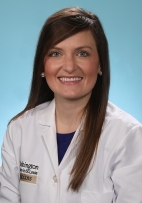DNP - Nurse Anesthesia (CRNA)
The DNP Nurse Anesthesia Program's annual application opens in July each year.
Application Deadline: March 1
NursingCAS will no longer be used for admissions, if you previously started your application using NursingCAS, your application will be converted to Slate and you will receive notification.
Please Note
Dates for 2026 interviews are TBD.
Details
Program Length
36 months
Term Start
Spring Term
Curriculum
In person and online

Kudos to our exceptional graduates from the Class of 2024 for their dedication and success.
- 2024 Graduating Class
Best Nursing-Anesthesia (CRNA) Schools
Goldfarb's CRNA program has been ranked #11 by U.S. News & World Report as part of the "Best Grad Schools" 2024 rankings. Based on a survey of academics at peer institutions, this achievement signifies that we are among the top nursing anesthesia programs in the country.
Concentration Overview
The Nurse Anesthesia Program awards a Doctor of Nursing Practice (DNP) degree with a Concentration in Nurse Anesthesia. The doctoral degree for nurse anesthetists allows nurses to join professions from medicine to dentistry and physical therapy who also obtain doctoral degrees. The nurse anesthesia program is full-time, 36 months in length, and includes coursework and clinical experiences. Due to the rigor of the program, students are encouraged not to work while enrolled in the program. Graduates of this degree will be prepared to become Certified Registered Nurse Anesthetists with a full scope of practice who will be prepared to administer anesthesia to patients throughout their lifespan from newborns to the elderly, no matter how sick or healthy.
Concentration Highlights
The DNP: Nurse Anesthesia concentration stands apart for many reasons. Here are just a few of the attributes that make us unique:
Intimate Learning Environment
Small classes and one-on-one interaction with faculty provide an ideal learning environment. Our curriculum, taught by faculty who are practicing CRNAs and anesthesiologists in the Department of Anesthesiology at Washington University School of Medicine, includes multiple nurse anesthesia courses, core nursing courses of evidence-based practice, health policy, and ethics, as well as an anatomy course with a semester-long dissection of cadavers.
World-Class Clinical Simulation Institute
You’ll implement your classroom knowledge with clinical scenarios and skills labs through our Clinical Simulation Institute. Simulation is routinely used throughout the program to teach, train, and ultimately empower our students with the full range of anesthetic procedures and equipment. Simulation is also used to help prepare the student on how to manage complications in the surgical patient and to build critical thinking skills. Scenarios include adult, pediatric obstetric, trauma, and gerontologic patients across the lifespan.
Clinical Training at Top Institutions
You’ll have an opportunity to fulfill your clinical training through affiliations with the region’s top institutions at Barnes-Jewish Hospital, Barnes West County, St. Louis Children's, Children's Specialty Care Center, Progress West Hospital, Missouri Baptist Medical Center, and Shriners Children's.
Exceptional Outcomes
Historically, our employment rate before graduation has always been 100%, our certification examination pass rate is exceptional, and our attrition rate remains low. The overall first-time certification examination pass rate since the program began in 2004 is 93.98% and the overall attrition rate since the program began is 1.48% (Attrition rate since 2010 is zero).
Career Prospects
Our graduates are prepared to enter a high-demand profession. Certified Registered Nurse Anesthetists have a variety of employment options following certification such as teaching hospitals, community hospitals, surgery centers, clinics, and small, critical-access hospitals. Our program is aimed at making the transition to one of these settings as seamless as possible. Our program focuses on providing anesthesia to very sick patients, but it also includes healthy patients. The program also helps develop strong leadership qualities. Many of our graduates have become CRNA leaders in their profession.
Accreditation
The Nurse Anesthesia Concentration at Goldfarb School of Nursing at Barnes-Jewish College is accredited by the Council on Accreditation of Nurse Anesthesia Educational Programs (COA).The program's next review by the COA is scheduled for October 2025.
Council on Accreditation of Nurse Anesthesia Educational Programs (COA)
10275 W. Higgins Road, Suite 906
Rosemont, IL 60018-5603
Phone: 224-275-9130
Website: www.coacrna.org/
Email: accreditation@coacrna.org
To find a list of COA accredited programs, visit www.coacrna.org.
Barnes-Jewish College Goldfarb School of Nursing is accredited by the Higher Learning Commission (HLC).
The baccalaureate degree program in nursing, master’s degree program in nursing, Doctor of Nursing Practice program and post-graduate APRN certificate program at Barnes-Jewish College Goldfarb School of Nursing is accredited by the Commission on Collegiate Nursing Education, 655 K Street NW, Suite 750, Washington, DC 20001, 202-887-6791.
The BSN program is approved by the Missouri State Board of Nursing.
Graduates of the Nurse Anesthesia Concentration will be prepared to take the National Certification Examination given by the National Board on Certification and Recertification of Nurse Anesthetists (NBCRNA) to become certified in the field.
Reputation
- Accredited by the International Federation of the Nurse Anesthetists (IFNA) since 2014
- 2024 attrition rate: 0
- Low overall attrition rate: 1.48%
- Employment rate: 100% prior to graduation since 2006
- 2024 first attempt pass rate: 80%
- Overall certification exam pass rate on first attempt: 93.98%
- Small class sizes
- Strong academic courses
- High-fidelity mannequin in a simulated OR used weekly
- Graduate Anatomy course that uses cadavers
- Strong clinical experience at level one hospitals, including Barnes-Jewish Hospital
- Experienced faculty who maintain clinical practice
- In-person anesthesia courses
- Feeling a part of the team of anesthesia providers

Brian Torres, DNP, CRNA

Sarah Perez, DNP, CRNA

Julia Downey, DNAP, CRNA

Abby Bisch, DNP, CRNA

Robert P. Walsh, PhD, MBA, CRNA

Patricia Hankey, BS
Sample Course Sequence
NOTE: Courses and sequencing are subject to change
| SPRING TERM | |
|---|---|
| Biostatistics and Epidemiology | 3 |
| Health Promotion Theory and Population Health | 3 |
| Foundations of Scholarly Writing & EBP | 3 |
| Advanced Pharmacology | 3 |
| SUMMER TERM | |
| Chemistry & Physics Applied to Anesthesia | 4 |
| Health Systems Policy | 3 |
| Leadership and Collaboration for Quality and Safety | 3 |
| Informatics, Economics and Financial Principles | 3 |
| FALL TERM | |
| Graduate Anatomy | 6 |
| Graduate Physiology | 4 |
| DNP Basic Principles of Anesthesia #1 | 2 |
| DNP Advanced Health Assessment for Nurse Anesthesia | 3 |
| SPRING TERM | |
| Advanced Pathophysiology | 4 |
| DNP Basic Principles of Anesthesia #2 | 3 |
| DNP Advanced Pharmacology and Anesthesia | 3 |
| Systems-Based Practice and DNP Project I | 3 |
| SUMMER TERM | |
| DNP Advanced Principles of Anesthesia #1 | 3 |
| DNP Clinical Experience I | 3 |
| Systems-Based Practice and DNP Project II | 3 |
| FALL TERM | |
| DNP Advanced Principles of Anesthesia #2 | 3 |
| DNP Clinical Experience II | 3 |
| Systems-Based Practice and DNP Project III | 3 |
| SPRING TERM | |
| DNP Clinical Correlation Seminar | 1.5 |
| DNP Professional Aspects of Nurse Anesthesia | 3 |
| DNP Clinical Experience III | 4 |
| DNP Project (Optional if project not completed) | 1 |
| SUMMER TERM | |
| DNP Clinical Correlation Seminar | 1.5 |
| Clinical Experience IV | 5 |
| FALL TERM | |
| DNP Clinical Correlation Seminar | 1.5 |
| DNP Clinical Experience V | 5 |
| TOTAL | 92.5 |
Admission Requirements
The following items are required when applying to the Nurse Anesthesia Concentration:
- Baccalaureate or Master’s Degree in Nursing from an accredited college or university (CCNE, CNEA, ACEN)
- Minimum cumulative grade point average of 3.0 on a 4.0 scale in all undergraduate and graduate coursework
- Official transcripts for all undergraduate and graduate coursework
- Two letters of reference from individuals who can address the applicant’s academic and clinical potential
- Curriculum vitae (CV) or resume
- Current unencumbered, unrestricted Missouri licensure as a Registered Nurse or a multi-state compact license and in good standing.
- Prerequisites (undergraduate or graduate, 3 credit hours each and satisfactory grade)
- Physics (algebra-based)
- Organic Chemistry or Biochemistry
- Undergraduate or Graduate Statistics
- Anatomy and Physiology (most likely taken in undergraduate nursing)
- A personal statement addressing why you want to become a CRNA
- A minimum of one year of recent critical care nursing experience as a Registered Nurse in a critical care setting in the United States, its territories, or a U.S. military hospital outside of the U.S
- Highest priority is given to those who have the most recent work history in a high acuity ICU setting where the applicant is likely to have a broad base of invasive hemodynamic monitoring experience, vasoactive drug administration, and experience monitoring patients on ventilators and adjusting settings. Applicants who work in post-anesthesia care units or emergency rooms will be considered only if the candidate can demonstrate that he/she routinely cares for patients with ventilators, invasive monitors, and vasoactive infusions.
- Current ACLS and BLS certification throughout enrollment; PALS before beginning clinical activities and throughout enrollment.
- If selected, an on-site interview by the Nurse Anesthesia Admissions Committee
- If an applicant has previously been enrolled in a nurse anesthesia program, he/she can apply; however, no anesthesia-specific courses will be transferrable
- Advanced Standing/Transfer Credit: Doctoral-level courses may be accepted for transfer only if approved by the Program Director and Faculty member. A maximum of (9) credits may be accepted for transfer and only those with an A or B may be transferred.
- International applicants should check with the Admissions Department for further instructions on admission requirements
- If accepted, there will be a $1000 non-refundable enrollment deposit for the CRNA program. This deposit amount is only for our CRNA program and is due to the competitive nature of this program.
*Prerequisites completed through StraighterLine will not be accepted after Jan 1, 2026. If you have taken a course through StraighterLine, please contact the CRNA program director.
Frequently Asked Questions
The Nurse Anesthesia Program admits one cohort each year. Class size is approximately 15-20 each year. The application deadline is March 1st with interviews normally held in April or May. The chosen applicants will then start the following January.
To start the application process, go to the website and click on “Start Your Application”. The application process is handled through a program called Slate. All supporting documentation should be submitted by the application deadline of March 1. All completed applicant materials are then reviewed for eligibility, and a decision is made on who will be invited for an interview with the Nurse Anesthesia Program Admissions Committee. Applicants not invited for an interview will receive an email notification – with a decision being posted to their student portal.
Interviews are scheduled over 2-3 days and are held in April or May. Applicants selected to interview are contacted by email to schedule their interview. During the interview, applicants will also receive a tour and get an opportunity to ask questions to students presently in the program. At the conclusion of the interviews, the committee ranks all applicants and selects those applicants who will be offered a position in the next class. Alternate candidates are also selected in the event an applicant does not take the offered position. Notification regarding acceptance and those chosen as alternates are managed through Slate and the Admissions Department shortly after the Admissions Committee decides on who will be selected.
It is highly recommended that candidates begin the application process well in advance of the application deadline to assure that all admission requirements are met by the deadline. The Nurse Anesthesia Program is extremely competitive due to acceptance to the program one time per year and the small number of candidates accepted to each class. To be a stronger applicant, required prerequisite coursework should be completed by the application deadline. If an applicant does not complete the prerequisite courses prior to the application, they will be allowed to complete this coursework following the application deadline and may be considered for an interview. It is beneficial for the applicant to be enrolled in the coursework at the time of applying and give an update on how the course is progressing, including giving an update on the course grade at the time of applying. If an interview is offered and the applicant is selected as a candidate for the class, admission is contingent upon successful completion of the outstanding courses. However, not completing the prerequisite course work prior to applying will make the applicant less competitive
If an applicant does not complete the prerequisite courses prior to the application, they will be allowed to complete this coursework following the application deadline and may be considered for an interview. It is beneficial for the applicant to be enrolled in the coursework at the time of applying and give an update on how the course is progressing, including giving an update on the course grade at the time of applying.
If an interview is offered and the applicant is selected as a candidate for the class, admission is contingent upon successful completion of the outstanding courses. However, not completing the prerequisite course work prior to applying will make the applicant less competitive.
On average, for each position available for admission, approximately 7-10 applications are received. Of this applicant pool, approximately 35 candidates are interviewed per class. Of the candidates interviewed, 15-20 applicants are selected for each class, with 3-4 additional alternate candidates selected to fill any position declined by a selected candidate.
Yes, you can apply to our program if you already have a Master’s Degree in Nursing or if you already took master’s level courses. Up to nine credits can be transferred for credit. These courses must be exactly equivalent to the courses offered in the program in order to be transferred.
An applicant’s GPA from the baccalaureate degree is considered and a cumulative GPA is calculated from all college/university transcripts. Science GPAs are also reviewed. Transcripts are also reviewed, including grades for prerequisite and science courses as well as overall academic achievement. Science grades are weighted heavily.
References in letter format are preferred for applicants to the Nurse Anesthesia Program. Letters provide more in-depth information regarding applicants than a reference form with a few lines for comments. The person writing the reference letter should include his/her association with the applicant (co-worker, supervisor, CRNA, physician, etc.). However, most importantly, the person should address the applicant’s academic and clinical potential for the Nurse Anesthesia Program.
A minimum of one year of critical care experience is required by the time the applicant starts the program; however, more experience strengthens your application. Highest priority is given to applicants with the most recent experience in a high acuity ICU setting at a Level One Trauma Center (larger hospital/medical center) where the applicant is likely to have a broad base of invasive hemodynamic monitoring experience, vasoactive drug administration, and experience monitoring patients on ventilators and adjusting settings. Applicants who work in post-anesthesia care units or emergency rooms will be considered only if the candidate can demonstrate that he/she routinely cares for patients with ventilators, invasive monitors and vasoactive infusions. The ICU experience must be from a hospital in the United States, its territories, or a US military hospital outside of the U.S.
The Nurse Anesthesia Program does not accept OR as critical care experience. The Council on Accreditation requires one year of ICU/critical care experience. It is highly recommended for our program that the experience be from an ICU rather than PACU or ER. A critical care area is defined as one where, on a routine basis, the registered professional nurse manages one or more of the following: invasive hemodynamic monitors (such as pulmonary artery catheter, CVP, arterial); cardiac assist devices; mechanical ventilation; and vasoactive infusions. Examples of critical care units may include but are not limited to: Surgical Intensive Care, Cardiothoracic Intensive care, Cardiovascular intensive Care, Coronary Intensive Care, Medical Intensive Care, Neurology Intensive Care, Trauma Intensive Care and Pediatric Intensive Care.
Students in the Nurse Anesthesia Program gain clinical experience throughout the program from multiple hospitals, including Barnes-Jewish Hospital, St. Louis Children’s Hospital, Children’s Specialty Care Centers, Shriner’s Hospital, Missouri Baptist Medical Center, Barnes West County, and Progress West Hospital. Patients at many of these hospitals have high acuity. Applicants should be very skilled in caring for patients who are on ventilators, have invasive lines, and/or have a variety of medicated infusions. Those who have experiences in other areas may be considered, provided they can demonstrate competence with managing unstable patients, invasive monitoring, ventilators, and critical care pharmacology.
Students in the Nurse Anesthesia Program gain clinical experience throughout the program from multiple hospitals, including Barnes-Jewish Hospital, St. Louis Children’s Hospital, Children’s Specialty Care Centers, Shriner’s Hospital, Missouri Baptist Medical Center, Barnes West County, and Progress West Hospital. Patients at many of these hospitals have high acuity. Applicants should be very skilled in caring for patients who are on ventilators, have invasive lines, and/or have a variety of medicated infusions. Those who have experiences in other areas may be considered, provided they can demonstrate competence with managing unstable patients, invasive monitoring, ventilators, and critical care pharmacology.
Neonatal ICU experience, due to its limitation in caring for newborns, is not acceptable for our program. Pediatric ICU (PICU) experience is acceptable if the applicant can demonstrate excellent experience or knowledge in caring for children and young adults who are on ventilators, have invasive lines, and have a variety of experience with medicated infusions, as well as with medical conditions common to adults. The applicant with PICU experience is encouraged to have adult critical care experience, too, but it is not required.
Yes – we ask students to request their official transcripts and letters of recommendation be sent electronically to Goldfarb Admissions (admissions@barnesjewishcollege.edu). Upon receipt, all applicant materials will be uploaded by Goldfarb Admissions to the applicant’s student portal checklist. Students can view their checklist items to see which action items have been completed or received.
It is important to start the application process for the program as soon as possible to meet the deadline and avoid any last-minute issues that could delay your consideration for admission to the program. Applications are required to be submitted through Slate – our student applicant portal. The college does not accept applications via US mail. All additional required documentation must be uploaded to the applicant’s account. This documentation includes a current resume or curriculum vitae, a personal statement, evidence of a current nursing license as well as evidence of ACLS, BLS and PALS certification. Other certifications and awards should be uploaded to your account.
Refer to the College website for complete information regarding required documentation as an international student.
For additional information or questions, please contact Ms. Malou Jaime, International Student Advisor, via e-mail (maria.jaime@bjc.edu) or phone (314.454.8686).
Applying to the Nurse Anesthesia Program requires that the applicant have a minimum cumulative GPA of 3.0. If the minimum cumulative GPA is below 3.0, the applicant will not be considered for admission and should not apply. An applicant can raise the GPA by retaking courses to improve a grade or taking additional courses and receiving higher grades. A new GPA will then be re-calculated from both new and previous transcripts. However, raising a GPA is a slow process -- the more hours of coursework taken, the slower the process.
Science courses and critical care experiences are two areas that are weighted heavily. If you have science prerequisite coursework to complete, an A or a B for the course will enhance your application. Experience in a Level I trauma center will provide you with a wide variety of critical care experiences.
Experience with adult patients is highly recommended in critical care areas, such as cardiothoracic, cardiovascular, cardiac, medical, surgical, neurology, PICU, and trauma. It is important to have a wide variety of experiences, which may require having more than just the minimum requirement of one year of experience. Although not a requirement for the program, CCRN certification is highly encouraged as it will enhance your application. If you do not have CCRN certification but are eligible to take the exam, it is strongly recommended.
Although not a requirement for the program, CCRN certification is highly encouraged as it will enhance your application. If you do not have CCRN certification but are eligible to take the exam, it is strongly recommended or it will weaken your application.
The core nursing courses are all offered online and most of the nurse anesthesia-specific courses are offered in person; on-campus attendance is required for these courses. Attendance at class and in the OR is mandatory.
Completion of the program can only be done on a full-time basis; no part-time enrollment is available.
Either course will fulfill the requirement as long as it is three credit hours. However, course content must be specific to Organic Chemistry or Biochemistry. The course should not be a general chemistry course only. Personal preference, based on course descriptions, may influence an applicant’s choice of organic vs. biochemistry, but this choice will have no bearing on the likelihood of admission. What is important in the review process is the grade obtained for the course.
Undergraduate physics is a prerequisite for the program. It should be algebra-based, and it should be a 3-credit course. A lab section is not required.
Labs are not required for these prerequisite courses. It is required that the courses be at least three credit hours, and that the Physics course be algebra-based. A basic understanding of the content of these courses is the prerequisite goal.
The Nurse Anesthesia Program at the Goldfarb School of Nursing at Barnes-Jewish College is fully accredited by the Council on Accreditation of Nurse Anesthesia Educational Programs. The Program is also internationally accredited by the International Federation of Nurse Anesthetists (IFNA). The College also holds accreditation by the Higher Learning Commission (HLC) of the North Central Association and the Commission on Collegiate Nursing Education (CCNE).
Please see the website for the tuition and fee schedule for the nurse anesthesia program. There will be additional costs other than tuition and fees, including textbooks, attendance at meetings, AANA student membership fees, fees for a background check and drug screening, graduation fees, the national certification exam fee, and the self-evaluation exam fee.
Please note that health insurance is required while in the program and the cost can vary from person to person. Please research what your cost for health insurance will be while you are enrolled in the program. Costs are subject to change.
No, the GRE and GMAT are not required to apply to the Nurse Anesthesia Program.
Although there are no specified time limits for prerequisite coursework, it is preferred and beneficial to the applicant that coursework be recent, especially regarding the sciences.
Although a shadowing experience is not required, it is highly encouraged. Shadowing a CRNA helps the applicant to better understand the role of the CRNA.
If you know a CRNA, you can ask to shadow him/her. You can also call anesthesiology departments of hospitals and ask for an opportunity to shadow a CRNA. There are no minimum number of hours required.
A typical day depends on the term. During the first two terms of the DNP program, students are not in the OR and a highly motivated student may be able to work but it will not be easy, and your coursework may suffer as it is a very rigorous, full-time program. During the third term, students carry a heavy academic load, and many of the courses are on campus. Students also spend clinical time in the Center for Preoperative Assessment and Planning.
Students start clinically in the OR in the fourth term along with continuing coursework at the College. As students progress through the program, class time decreases, and clinical time in the OR increases. During the last few terms, students are in the OR, and they are also enrolled in a course that prepares them for the national certification examination. Students are highly encouraged to not work while enrolled in the 3-year program.
Students may be able to work part-time during the first and possibly the second terms since most of their courses are online during these terms if they are highly motivated, but it will not be easy. It is highly recommended that students do not work while enrolled in the program due to the demanding academic coursework and high volume of clinical time. A grade below a “B” is unacceptable for Nurse Anesthesia-specific courses and will result in termination from the program.
Most of the clinical sites are on the Washington University-Barnes-Jewish Hospital Medical Center campus. For example, Barnes-Jewish Hospital, both north and south campuses, along with St. Louis Children’s Hospital, are connected by an internal walkway. Shriner’s Hospital is only a few blocks away and within walking distance from the College. The other clinical sites are less than 30 miles from the College.
- Continue to work in the critical care setting and obtain more critical care experience. The Council on Accreditation requires a minimum of one year of critical care experience. However, that is often not enough to be accepted. Continuing in the critical care setting for a longer period will strengthen your application.
- Recent/current ICU experience is recommended, so if you do not have recent/current ICU experience, consider returning to the ICU.
- Try to learn as much as you can while working in the critical care area. Ask questions and think critically about the actions you are doing. If you hang an infusion of a particular drug (narcotic, sedative, vasopressor/vasodilator), make sure you know the mechanism of action, side effects, etc. Why would you be given specific pharmacotherapies? What is it about the patient’s status that indicates the plan of care that you are doing? Interpret lab values, CBC, BMP, ABGs and anticipate actions. If you have any questions or confusion about the care the patient is receiving, ask the physician, NP or senior ICU nurse, or read about the disease processes. Increase your knowledge base.
Here are more suggestions:
- Consider working in a level one hospital. These patients are often more complex with multiple comorbid conditions, so you will be challenged taking care of patients with higher incidences of morbidity and mortality. This also affords more opportunities for critical thinking and working with new, advanced technologies.
- Obtain your CCRN if you have not done this yet. It is best to have your CCRN prior to applying.
- Increase your overall cumulative GPA. This is done by taking more courses and getting As. However, realize that the more courses that you have taken in the past, the slower this process is to increase your overall GPA.
- Complete your prerequisite courses before you apply again. We like to see that the courses have been successfully completed when one applies to the program.
- If you only have pediatric critical care experience, consider working in an adult setting for more critical care experience.
- If you only have ER or PACU experience, consider transferring to an ICU.
- Seek out leadership opportunities within your unit. Be proactive in joining or participating in research or QI projects within your unit.
The Washington University Department of Anesthesiology, where the nurse anesthesia students are trained clinically, hires CRNAs. The department has more than 150 CRNAs working for them in various hospitals. Please reach out to eisenbad@wustl.edu or erinherrera@wustl.edu for more information.
Tuition and Fees
Barnes-Jewish College Goldfarb School of Nursing reserves the right to adjust tuition and fees at any time. For additional information, please contact our Business Office.
| Tuition | Per Credit |
|---|---|
Graduate Tuition Doctor of Nursing Practice |
$834 |
| Fees | Per Term |
|---|---|
| Doctor of Nursing Practice | $3115 |
Request Information
Request more information by filling out the form below.
